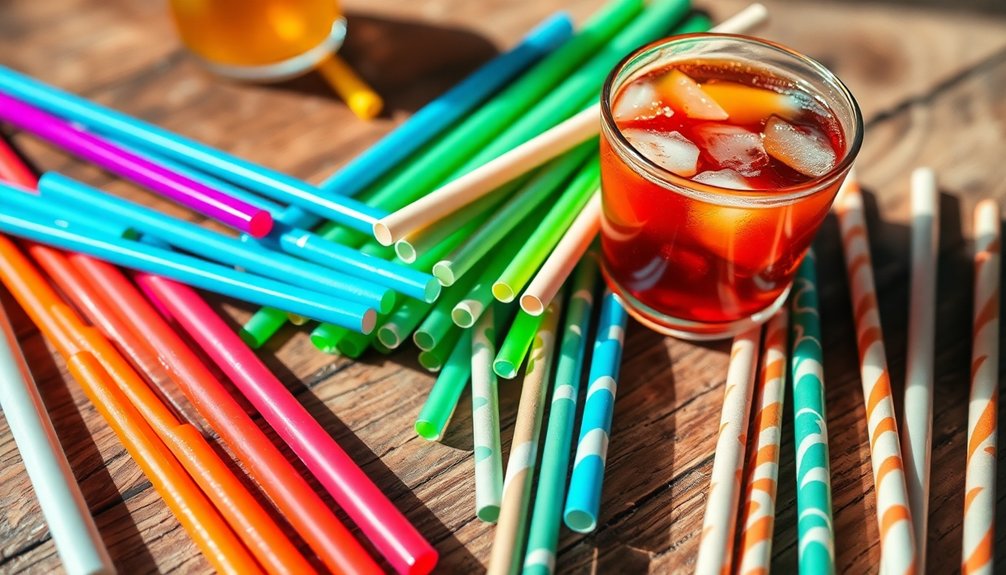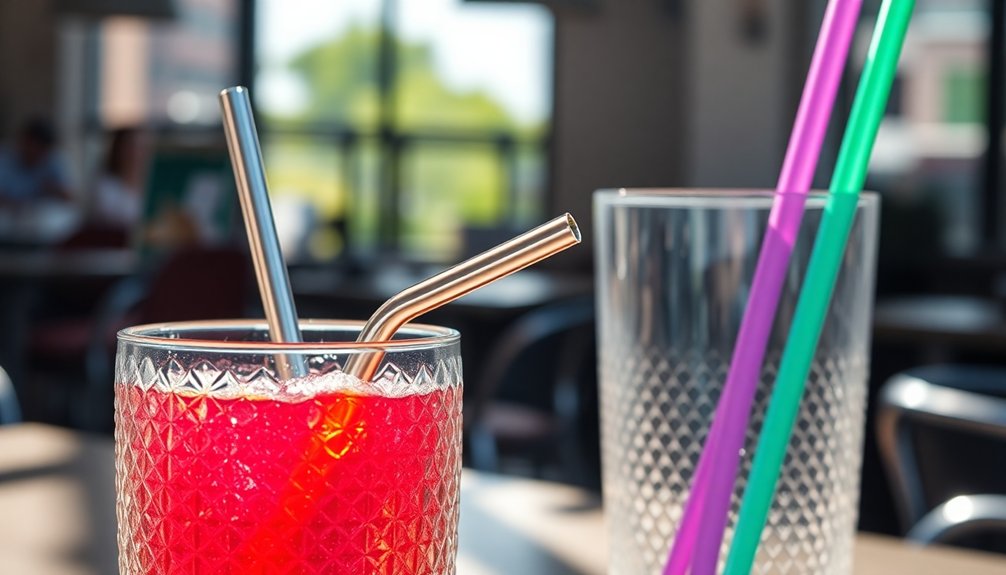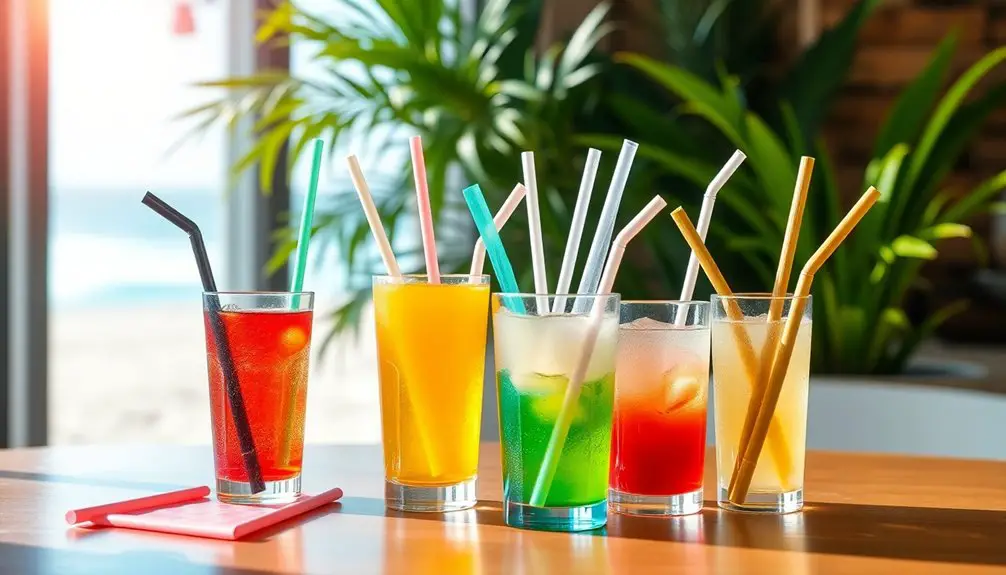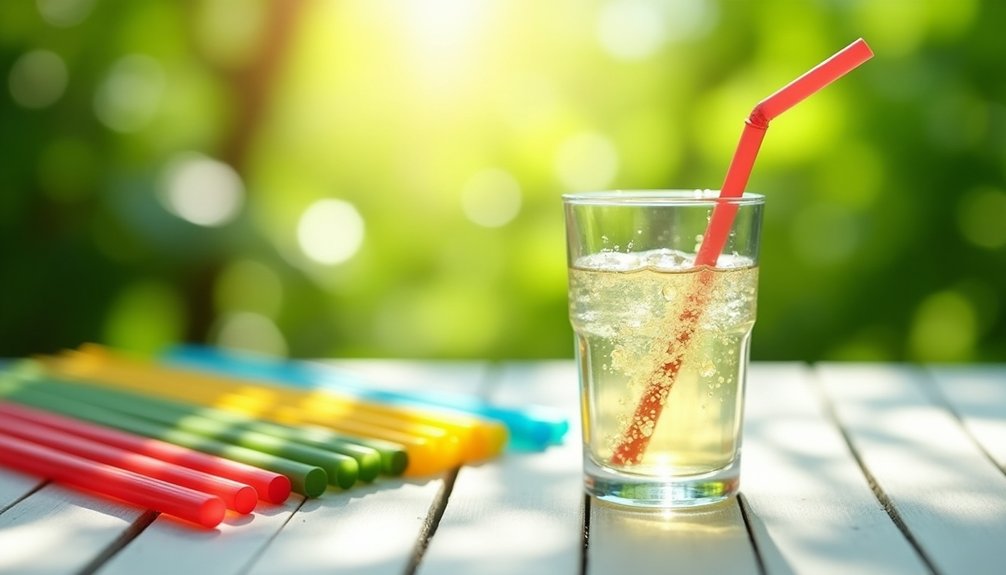Polypropylene straws aren't entirely safe; they can leach harmful chemicals into your drinks, especially when exposed to heat or wear. These straws also contribute to plastic pollution, taking up to 200 years to degrade and creating microplastics that harm ecosystems. If you're looking for better options, consider glass, stainless steel, or plant-based straws. Glass straws are durable and chemical-free, while stainless steel ones are rust-resistant and reusable. Plant-based straws are biodegradable and compostable, offering an eco-friendly choice. Explore these alternatives to protect your health and the environment while enjoying your favorite beverages.
Key Takeaways
- Polypropylene straws are non-biodegradable, persisting up to 200 years and contributing significantly to ocean pollution and microplastic contamination.
- Chemical leaching from polypropylene straws, including harmful additives, poses health risks, such as endocrine disruption and potential carcinogenic effects.
- Alternatives like glass and stainless steel straws are reusable, do not leach harmful chemicals, and significantly reduce plastic waste.
- Plant-based straws, made from materials like bamboo and sugarcane, are fully biodegradable and compostable, offering a sustainable option with lower environmental impact.
- While paper straws are an alternative, they carry risks of PFAS contamination, raising health and environmental concerns similar to plastic straws.
Safety Overview of Polypropylene
Polypropylene straws are often seen as a convenient choice for beverages, but their safety profile raises significant concerns.
First, these straws are non-biodegradable, persisting in the environment for up to 200 years and breaking down into harmful microplastics. This pollution can infiltrate living organisms, potentially affecting human health and contributing to climate change, as evidenced by the impact of plastics on ecosystems. Additionally, the production of polypropylene straws contributes to the staggering statistic that only 9% of plastics produced since the 1950s have been recycled globally.
You mightn't realize that the production of polypropylene straws consumes substantial amounts of oil and natural gas, leading to greenhouse gas emissions equivalent to millions of cars on the road.
Despite being technically recyclable, only about 3% of these straws actually get recycled, mainly due to their small size and flexibility. Consequently, many end up in landfills or incinerators, creating more environmental issues, with approximately 91% of plastic waste generated not being recycled.
Moreover, polypropylene straws can leach harmful chemicals like bisphenol A (BPA) as they degrade. This chemical poses environmental and health risks, not just to wildlife but possibly to humans too.
As you consider your options, it's essential to weigh these safety concerns against the convenience these straws provide. Exploring alternatives may be a more responsible choice for both your health and the environment.
Understanding Chemical Risks
When using polypropylene straws, it's essential to consider the potential for chemical leaching into your drinks. Although the risk is generally lower than with other plastics, factors like heat and scratches can increase the likelihood of harmful substances being released. Understanding these risks helps you make informed choices about what you consume. Additionally, it's crucial to recognize that plastic straws contribute significantly to marine pollution, highlighting the environmental impact of continued use. Also, it's vital to note that many polypropylene straws have a recycling code that can be checked to ensure safer use.
Chemical Leaching Risks
Understanding the chemical leaching risks associated with polypropylene straws is essential for making informed choices about their use.
Polypropylene, while durable, isn't without its downsides. The material's composition often includes chemical additives, which can leach into your drink over time. Factors like physical damage, temperature effects, and environmental exposure can increase the risk of chemical leaching. This concern is underscored by the fact that approximately 500 million single-use straws are used daily in America, many of which may contribute to health risks.
Here are some key considerations:
- Material Composition: Polypropylene's polymer structure can lead to leaching of harmful chemicals.
- Leaching Mechanisms: Wear and tear, combined with heat, can enhance liquid uptake and leaching.
- Common Contaminants: Straws may contain endocrine disruptors such as phthalates, which can be harmful.
- Environmental Factors: Exposure to sunlight and heat can accelerate degradation, increasing leaching risks.
Health Impact Concerns
Recognizing the potential health impact concerns associated with the use of polypropylene straws is crucial for consumers. While these straws don't contain Bisphenol A (BPA), which is linked to various health issues, they may include phthalates. These chemicals can leach into your drinks, potentially causing asthma, cancers, and developmental problems. Additionally, polypropylene is marked with number five, indicating it is considered a safer plastic compared to others.
Although polypropylene is generally considered safer than polystyrene, it still has chemicals like benzene and styrene that can irritate and may pose carcinogenic risks. Repeated use of polypropylene straws can lead to chemical leaching, particularly when they're scratched or heated. This raises concerns about the substances that could be released into your beverages.
Additionally, phthalates and styrene can act as endocrine disruptors, affecting hormone levels and possibly leading to serious health conditions. Microplastic ingestion is another worry, as it may have health implications that remain largely unexplored.
Pregnant women should be especially cautious, as exposure to certain plastics can impact infant brain development and increase the risk of anxiety and hyperactivity in children. Staying informed about these risks can help you make safer choices for your health and well-being.
Exploring Paper Straw Alternatives

When considering paper straw alternatives, you can't ignore the risks of PFAS contamination, which can leach harmful substances into your drinks. Additionally, the environmental impact of producing these straws raises serious concerns, from deforestation to greenhouse gas emissions. Most recycling facilities reject food-contaminated products, leading to landfill disposal, making it crucial to weigh these factors as you look for safer and more sustainable options. Furthermore, single-use products, such as paper straws, contribute to the staggering 13 million metric tons of plastic waste that enters oceans annually, emphasizing the need for responsible consumption choices.
PFAS Contamination Issues
You might think that switching to paper straws is a safer and more eco-friendly alternative to plastic, but recent findings highlight serious concerns about PFAS contamination in these products.
Studies show that PFAS, or per- and polyfluoroalkyl substances, are present in a significant number of paper straws, raising alarming health and safety issues.
Consider these points:
- High Detection Rate: PFAS were found in 90% of tested paper straws.
- Manufacturing Concerns: PFAS are often added during manufacturing for water-repellent coatings, leading to contamination. In fact, approximately 70% of plastic straws tested positive for PFAs, suggesting that the issue is not limited to paper products.
- Health Risks: Long-term exposure to PFAS is linked to severe health effects, including cancer and decreased fertility.
- Regulatory Gaps: There's a lack of consistent regulations regarding PFAS in food contact materials, complicating safety assessments.
With such high levels of PFAS contamination, you may want to reconsider the assumption that paper straws are a healthier choice.
While they seem like a viable alternative, the hidden dangers could outweigh the benefits, placing your health at risk.
Environmental Impact Concerns
While concerns about PFAS contamination in paper straws have emerged, it's important to look at the broader environmental impact of these alternatives to plastic.
Paper straws require more energy to produce—96 kilojoules compared to 39 for plastic. This higher energy consumption leads to greater carbon emissions, with 4.1 grams of CO2 produced per paper straw versus 1.5 grams for plastic. Additionally, Americans use 500 million plastic straws daily, highlighting the significant scale of plastic straw consumption that alternative options aim to address.
Moreover, the production of paper straws contributes to deforestation and habitat destruction, as they rely on organic materials. Even though paper straws biodegrade faster than plastic, they often don't meet the necessary breakdown criteria due to water-resistant polymers. They frequently end up in landfills, as most recycling facilities don't accept food-contaminated items.
Additionally, while reusable straws like metal or silicone offer a sustainable alternative, many compostable straws come individually wrapped in non-compostable materials, adding to waste.
You should consider reducing straw usage entirely or opting for reusable options to minimize your environmental footprint. In evaluating alternatives, it's crucial to weigh the overall impact on our planet, from resource extraction to waste disposal.
Benefits of Glass Straws
Glass straws offer a refreshing alternative to traditional plastic options, combining sustainability with health benefits. By choosing glass straws, you're not only making a safer choice for your health but also contributing to a healthier planet.
- Reduces plastic waste: Eliminate the need for disposable plastic straws, significantly cutting down on pollution.
- Chemical-free: Glass straws don't leach harmful chemicals like BPA into your drinks, ensuring safer sipping.
- Durable and reusable: Made from heat-resistant borosilicate glass, they last for years with proper care, minimizing the need for replacements.
- Hygienic: They're easy to clean, making them a practical choice for various settings.
Additionally, replacing plastic straws and wraps with eco-friendly alternatives like beeswax wraps can significantly reduce plastic waste and promote a more sustainable lifestyle.
Advantages of Stainless Steel Straws

With the growing awareness of environmental issues, many are exploring various alternatives to plastic straws, including stainless steel straws.
One of the biggest advantages of stainless steel straws is their durability. Made from high-quality materials, they resist rust, corrosion, and damage, lasting for years with proper care. You won't have to worry about frequent replacements, and their sturdiness makes them perfect for thick smoothies and shakes.
Cleaning these straws is a breeze, too. They're dishwasher-safe and resistant to staining, so you won't need special cleaners. A quick rinse after use keeps them hygienic and ready for your next drink.
Stainless steel straws are also eco-friendly. By being reusable, you significantly reduce plastic waste, contributing to less pollution in our oceans and landfills. When they reach the end of their life cycle, they can be recycled, promoting sustainability. Furthermore, choosing stainless steel straws can help minimize the impact of single-use plastics on the environment, which contribute to an estimated 40% of plastic produced being for single-use items.
Finally, stainless steel straws are safe for everyone, including kids. They're free from harmful chemicals, heat-resistant, and won't alter the taste of your beverages. With no risk of mold and a long lifespan, these straws are a smart choice for both health and the environment.
Plant-Based Straw Options
Plant-based straws are gaining popularity as a sustainable alternative to traditional plastic options. They offer a variety of materials that not only reduce waste but also provide unique benefits.
- Bamboo Straws: Durable and flexible, perfect for multiple uses, and compostable.
- Sugarcane Straws: Home compostable and can withstand high temperatures, entirely biodegradable.
- Rice Straws: Biodegradable and compostable, making them a great eco-friendly choice.
- Coconut Straws: Made from coconut fibers, these straws are biodegradable and suitable for both hot and cold beverages.
When you choose plant-based straws, you're not just opting for a functional product; you're also contributing to a more sustainable future.
These straws break down naturally, reducing environmental pollution and helping to create nutrient-rich soil. By selecting materials like bamboo or sugarcane, you're supporting renewable resources and minimizing your carbon footprint. Moreover, by switching to plant-based straws, you're helping to reduce the estimated 1.3 billion tonnes of CO2 emissions from polypropylene production, a significant contributor to climate change.
With a variety of options available, it's easier than ever to make eco-conscious choices that align with your lifestyle.
Comparing Environmental Impacts

When considering the environmental impacts of straws, it's vital to compare the effects of polypropylene straws with those of plant-based alternatives. Polypropylene straws pose significant environmental challenges, primarily due to their non-biodegradability. They can take up to 200 years to degrade, breaking down into harmful microplastics that infiltrate ecosystems. On the other hand, plant-based straws decompose naturally, presenting a lesser threat to the environment. Moreover, the construction industry's shift towards sustainable alternatives, such as sustainable materials, highlights the potential for widespread adoption of eco-friendly practices. Here's a quick comparison of their impacts:
| Aspect | Polypropylene Straws | Plant-Based Straws |
|---|---|---|
| Biodegradability | Not biodegradable | Fully biodegradable |
| Recycling Rate | 3% recycled globally | Often compostable |
| Ocean Pollution Contribution | 8 million tons per year | Minimal |
| Impact on Wildlife | Harmful ingestion by marine life | Generally safe |
While polypropylene straws contribute heavily to landfill waste and ocean pollution, plant-based options provide a more sustainable choice. By opting for plant-based straws, you help reduce long-term ecological damage and foster a healthier environment for wildlife.
Frequently Asked Questions
Can Polypropylene Straws Be Recycled Effectively?
You'll find that polypropylene straws can't be recycled effectively. They're too small and lightweight for sorting systems, often ending up in landfills or oceans, contributing to pollution and harming marine life you care about.
What Is the Lifespan of Reusable Straws?
The lifespan of reusable straws varies by material. Stainless steel and glass last years, while silicone can endure but isn't biodegradable. Bamboo needs frequent replacement, and reusable plastic typically lasts 2-3 years. Choose wisely!
Are There Specific Brands of Straws to Avoid?
When choosing straws, avoid brands with high PFAS contamination, especially paper and bamboo types. Look for stainless steel options instead, as they're free from harmful chemicals and better for both your health and the environment.
How Do Polypropylene Straws Compare to Other Plastic Types?
When comparing polypropylene straws to other plastics, you'll find they're durable and economical, but not biodegradable. They may leach phthalates, though generally considered safe. Consider the environmental impact and recyclability when making your choice.
Are There Health Risks From Using Old Plastic Straws?
Using old plastic straws can pose health risks due to chemical leaching and microplastic formation. You might unknowingly consume harmful substances, impacting your hormone levels and overall health, along with contributing to environmental issues.

